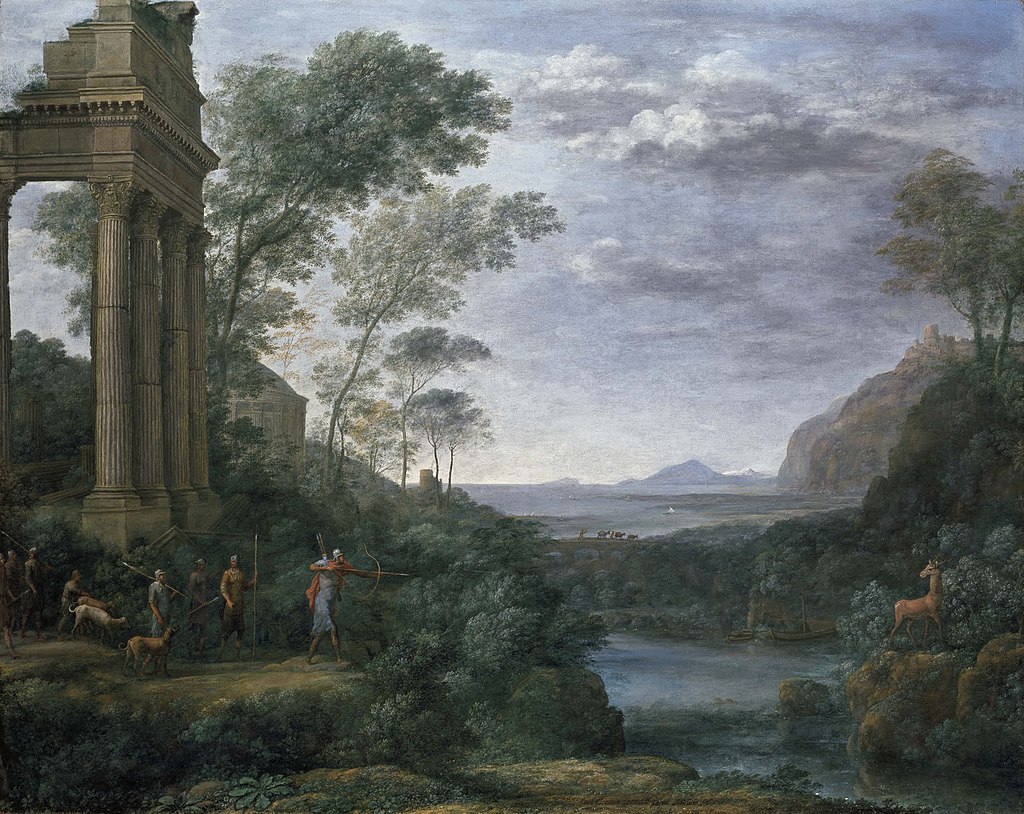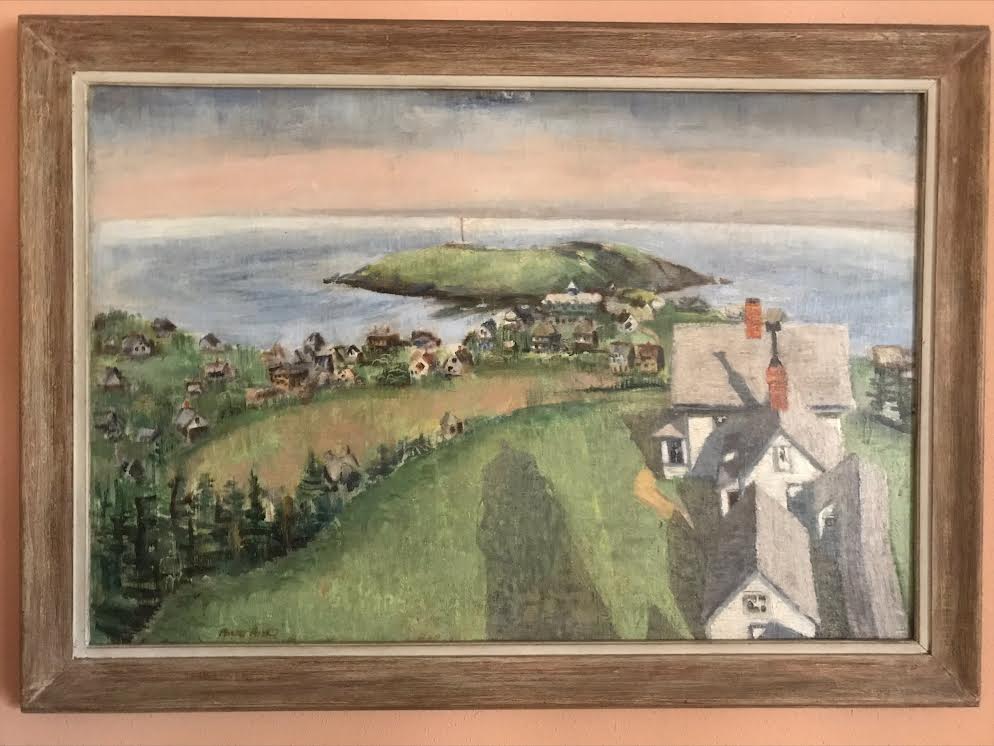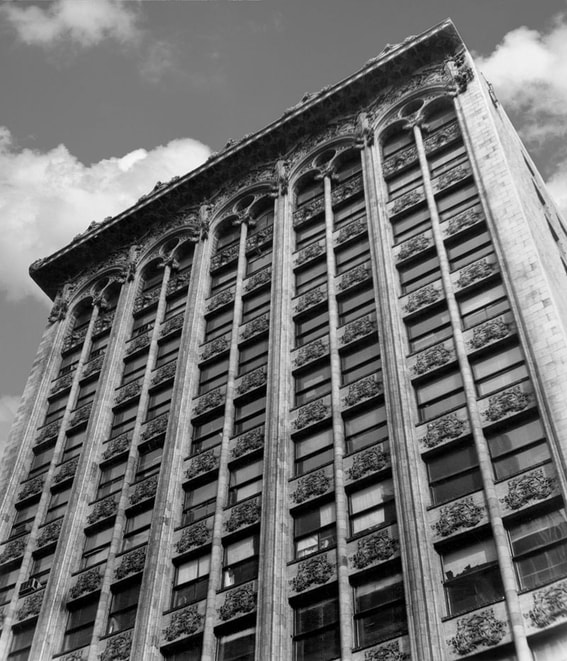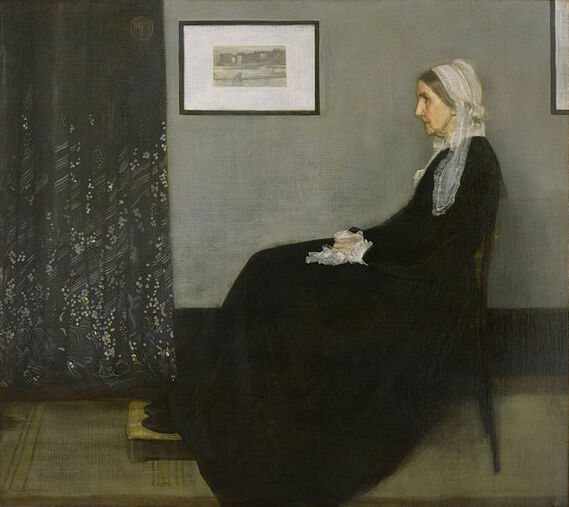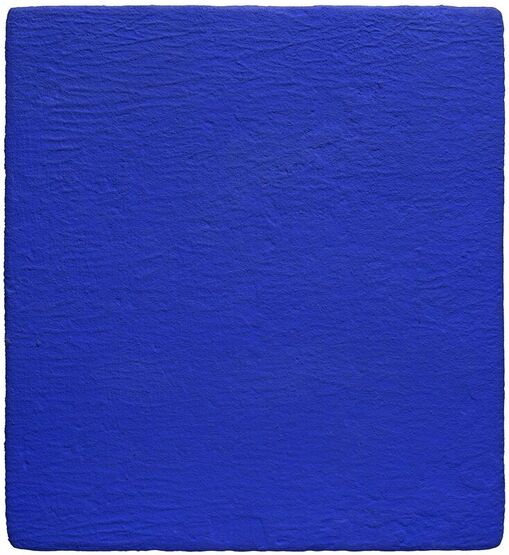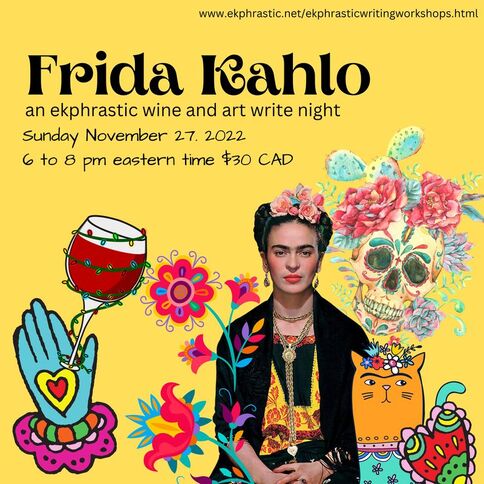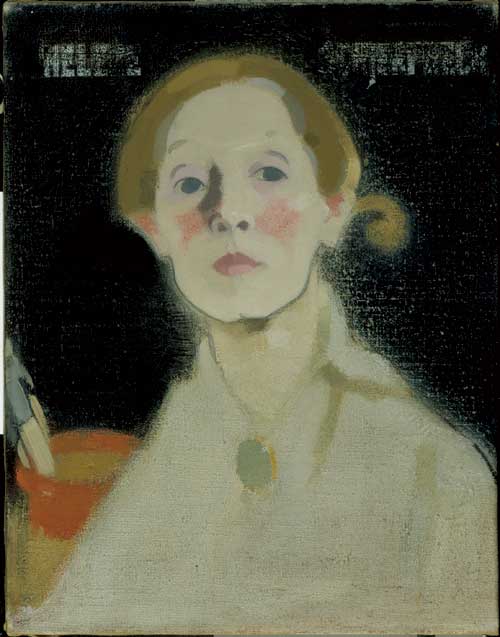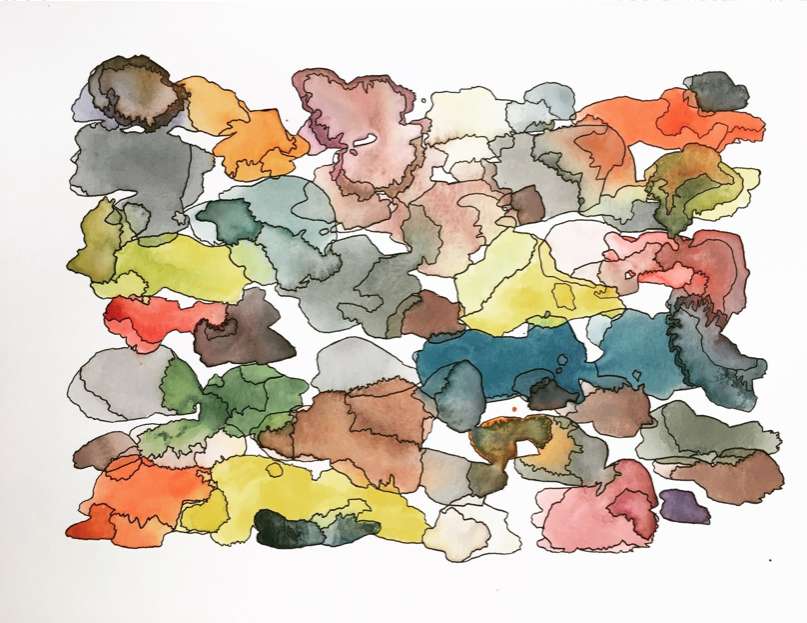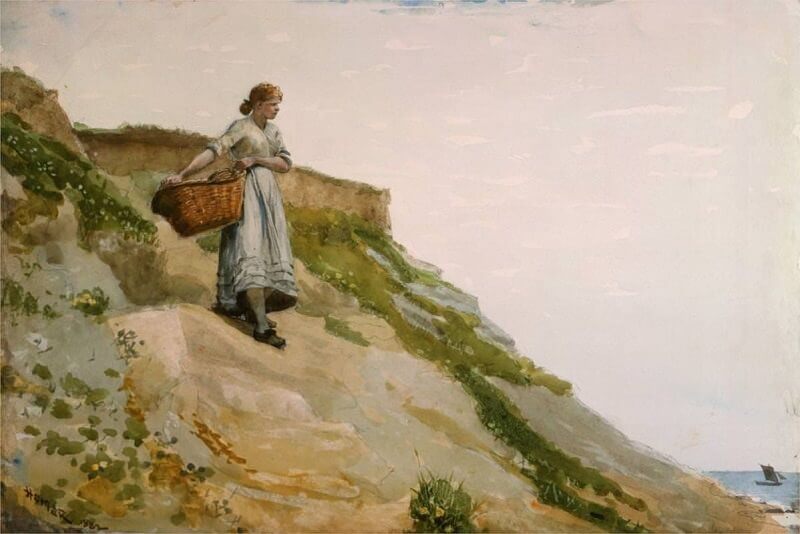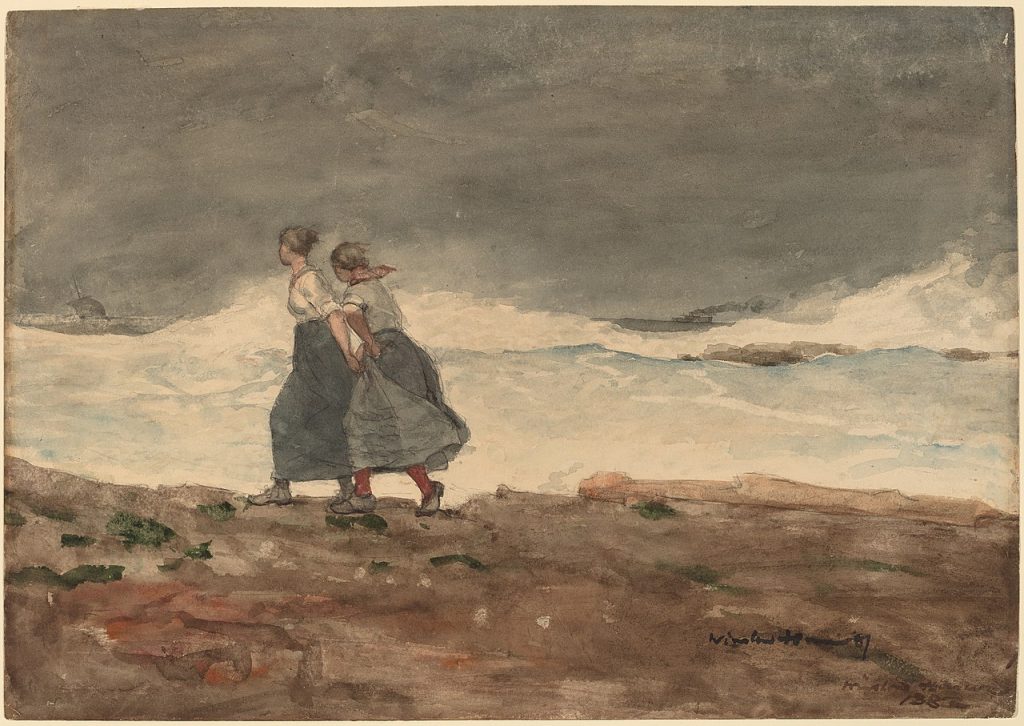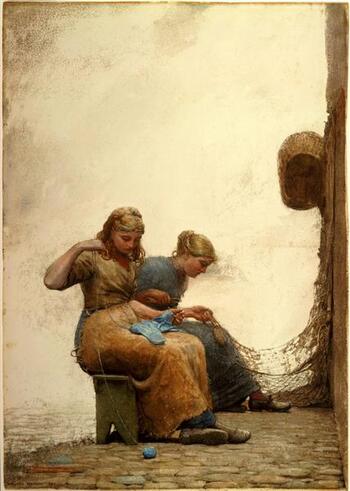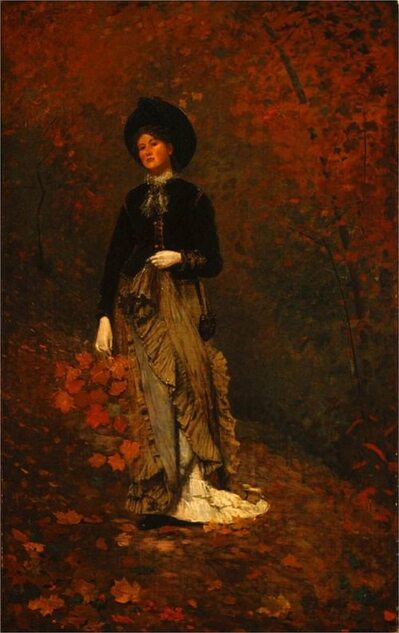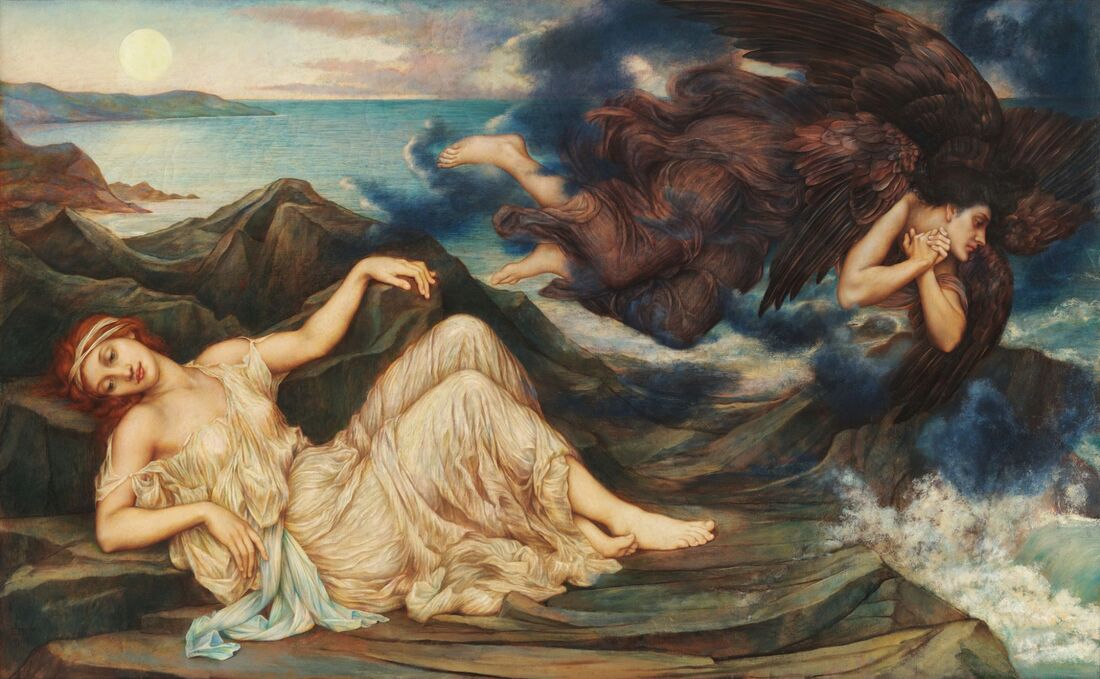|
Moriturus (Ascanius and the Stag) Cervulus ille redit, iamiam moriturus in urbe Quae non condita erat … Caught by perspective’s spell, the eye Lifts to that blurry reach of blue Above the bridge – a peak or two, Then cloudy trees meet branching sky: A prospect delicate as foam! Till, drifting left, you find, below, The lengthened form and levelled bow Of Prince Ascanius, heir of Rome. To see his target, you must turn: Across the bushy stream, due right, A stag, neck skewed, confronts his sight Direct: poor beast, about to learn History’s impetus, the blow Long told. Look left: the arrow’s set Straight at his lengthened throat, and yet – Look right – he stands there still, as though Saved by the context; through this frame Nothing can pass. Look right, look left; Pause at the entry point, that cleft Of edgeless blue. The sky’s the same, The bridge, the temple – not yet built, And yet already ruined, bare Against the still bucolic air. Heaped between loss and loss, the silt Of memory thickens, aided by The clench of art. What should we mourn? The stag waits, spindly as a fawn. Look back, look up: the stones rise high. The sky holds blue. The branching sky. Julia Griffin Julia Griffin lives in South-East Georgia. She has published in Light, Lighten Up Online, Snakeskin, and some other magazines.
0 Comments
The Shadow of the Lighthouse falls on the grass sloping down to the hotel at the edge of Monhegan Island in our painting by Paul Arlt, which hung in my parents’ living room in 1943 when my father worked in D.C. as our troops pushed ashore at Salerno and I was born. In the painting, we stand atop the absent lighthouse, looking beyond the hotel to a smaller island, then the curved horizon beneath a pinkish sky. General Kesselring’s panzers countered, then withdrew to their Winter Line slowly up the snowy central mountains, the “tough gut” of the Axis, said General Clark, apologizing to his men. Two decades later my brother and I retrieved the Chevrolet convertible of our father, divorced and dead, and drove it east, stopping at Dealey Plaza where in November President Kennedy had been hit, the Zapruder frame holding the instant not shown for years. The smaller island, Manana, is bare with just a foghorn station’s lone beacon sticking in the sky. A few sailboats sit in the harbour near the hotel where my family must have stayed when we visited and I was only a boy. Hunt Hawkins Hunt Hawkins' book of poems, The Domestic Life, won the Agnes Lynch Starrett Prize and was published by the University of Pittsburgh Press. Individual poems have appeared in Poetry, The Southern Review, The Georgia Review, Tri-Quarterly, Poet Lore, and many other journals. Hunt has lived in Norway, Myanmar, Tanzania, and Poland where he taught as a Fulbright Distinguished Professor at Jagiellonian University in Krakow. Louis Sullivan “The fairy delicacy, ceaselessly at work.” The Autobiography of an Idea, Louis H. Sullivan I say there’s something living in this common earth, Latent, not free before to manifest in flesh, Only to reach toward heaven, not sky; I say at last let us let it be true. Now come immense and peaceful migrations; Thundering engines of steel and steam; Instant electric signals; A new kind of light. Let ancient fathers remain at their rest; In this new world, even the stars are new. Seeking with all of their youthful pride, Born in the breadth of the Mississippi River, The redwoods that tower above the Pacific, The thousand-mile horizons over the prairies, Unpent mankind begins to bend back All the massed superstitions. Can will command nature? I say will is nature. As the tree in the seed, so are we liberated. A bridge leaps the gap, knit from steel tendrils; Stones once defiant yield at last, And summon new angels who, Stretching their wings, Form a canopy like boughs shielding the garden Where a gentler force unfurls: Vitality groping toward its fate, Enfolding its frame in a million faceted intricate blossoms; A lace of vines and fractal structures, glittering effulgences; The asymmetric, incalculable, wild marvel of ensoulment. I say new bones, new life. Yes, Emerging like Eve from Adam’s rib of iron, From starbursts and diamonds and oak leaves, Spinning atoms’ forces and the Feminine swells that bring new creation; Gravity now is balanced on lightness; Great masses expertly poised upon pinpoints; Arches throwing their compass feet forward, Toward a tomorrow certain to be. Let me show you the golden doorway. Step through, Step through. Timothy Sandefur Timothy Sandefur: "I'm an attorney and author located in Phoenix, Arizona. I've published several books, including my first book of poems, Some Notes on the Silence, which came out this past spring, from Kelsay Books. My poem "New York City Haiku" appeared in The Ekphrastic Review this past summer." Even Now mother paints, marks my canvas from beyond time twenty years passed held by limitless light lids emit ice blue influence even now blessed or cursed her shadow covers blankets to her will be like her or not say wizened crones daughters of night telling my life history of tomorrows Julie A. Dickson This poem was inspired by another painting, called The Artist's Mother, Josephine, by Joseph Sulkowski (USA), contemporary. Julie A. Dickson has written poetry since age 12, writing her conduit to memories, both creative and cathartic. She has dabbled with Ekphrastic poems for several years now and enjoys the visual prompt. Her poems have appeared in many journals including Girl God, Misfit, Open Door and The Ekphrastic Review. Dickson holds a BPS in Behavioral Science and is a past poetry board member and Pushcart nominee. She loves cats and advocates for captive elephants. The Painter Who Painted Blue He painted blue and it didn’t mean anything which felt like a relief after so much caring and that’s what he probably liked best about it. Everything was too complicated, like his mother’s blue eyeshadow and his dad’s blue absence, and he wished as a child that he could paint every one of the family sadnesses blue. He stood in his own doorway often, staring out at the blue coloured promise of many blue coloured walls. He was handsome in a Buster Keaton kind of way, which made many unattached women feel blue. You can turn empty space into gold, he told the public, but he didn’t do that. He turned empty space into blue. His famous monochrome symphony of one-note paintings made even his critical mother feel proud. He may have been known as “the man who used to be blue inside.” He overthought everything unless it became blue, and the heart in his chest pumped out pieces of sky. Meg Pokrass Meg Pokrass is the author of numerous flash fiction collections, an award-winning collection of prose poetry, two novellas-in-flash, an award winning collection of prose poetry, and a 2020 collection of microfiction, Spinning to Mars, which won the Blue Light Book Award. Her work has appeared in Electric Literature, Washington Square Review, Smokelong Quarterly, Split Lip and McSweeney's has been anthologized in New Micro (W.W. Norton & Co., 2018), Flash Fiction International (W.W. Norton & Co., 2015) and The Best Small Fictions 2018 and 2019. She serves as Founding Co-Editor of Best Microfiction and Festival Curator of Flash Fiction Festival U.K. and teaches flash fiction online and in person. Find out more at megpokrass.com. Our last workshop of the year is a special Frida Kahlo wine and art night on Sunday evening! Join us to celebrate the legendary Mexican painter Frida Kahlo. We will relax with our choice of beverages from the comfort of Zoom at home, discuss Frida's amazing biography and artworks, and use her works for some creative writing exercises. Come and discover these special workshops where the ekphrastic community connects in conversation and creativity. Frida Kahlo- wine and art write night
CA$30.00
Mexican painter Frida Kahlo was a larger than life character and epic talent. She is known for her epic love affair with Diego Rivera, for her heroic struggle with numerous illnesses, and for her fascinating paintings. Join us online for a night of lively discussion, writing exercises, and wine sipping. Sunday November 27 2022 on Zoom 6 to 8 pm eastern time Doors open at 5.45 for optional meet and mingle. If you wish, bring your own wine, or tea, and snacks. On Helene Schjerfbeck’s Self-Portrait We’re ghosts. All of us. We’re humans for a little while, but ghosts for such infinity that the flesh is a speck, a flame-flicker, the fire of our cheeks like wishes, the artist realizing this, drawing the ghost inside us that’s aching to burst out so quietly, a haunting that’s almost boring, our insides gnawing to come outside, fall out of us. We’re brittle. Our weeks are seconds. The dark is waiting. Ron Riekki Ron Riekki’s books include My Ancestors are Reindeer Herders and I Am Melting in Extinction (Loyola University Maryland’s Apprentice House Press), Posttraumatic (Hoot ‘n’ Waddle), and U.P. (Ghost Road Press). He has received a Pushcart Prize, a Shenandoah Fiction Award, a Best Small Fictions selection, and been in several other anthologies. Right now, he's listening to Elbow's "One Day Like This." Outline for a Relief Map I. 1. The watercolours merge transparent as they are an inner landscape. I am trying to make the Unseen seen. 2. I trace their borders with a fine felt pen, allowing blending here, division there. The lines separate countries and people. 3. Here, highways are built, and boundaries are drawn red between plenty and scarcity. 4. Irregular lines in wood are called zone lines, battle fronts between fungal colonies. Their presence represents decay. 5. Oil pipelines leak, explode in the sea. Carried by current, oil permeates deep, and bleeds into coral, blue and green. 6. A lake contains many ages of water. When a body freezes over, the ages come together and form a mosaic in the ice. 7. The colours are resonant and shift, perspective tilts slightly forward. I am trying to bring Coherence to incoherence. II. 1. My eyes are the colour of glaz, which cannot be painted in the moment like light, or sky, or sea. 2. I render a river delta from the exosphere, desert, blue mountains, amber sky. I shape a map into a reverie. 3. I limn round solar mucilage in shades of crystalline green. I carve an impenetrable circle around you and me. 4. Monoculture surrounds a desiccated speck of sacred ground. I locate myself in a field of dead wheat. 5. I pour 800 million litres of ink for 87 days. I grind elderberry, sumac, wild plum to pulp. I paint for miles, blindfold myself, slash the canvas with a knife. 6. A glacier ablates into fragments. I speak kindness to it and heal seven generations back. I drink it and heal seven generations forward. 7. I am speaking of a vertical language written in the blood of trees. I weave a millennia of mycelia threading centuries of humus. I leave the threads uncut. Laura Rockhold Artist’s Statement for “Outline For A Relief Map” “Outline For A Relief Map” is an ekphrastic poem based on my art (e.g., “Relief Map”) and process. It explores lines that divide and unite us to each other and the earth, and our broken relationship with and responsibility to the land. It highlights the human-imposed order that runs against nature’s wildness and touches on themes of ecological restoration, reparations and world healing. Visually, the poem represents both an outline and a diptych. Symbolically, each stanza represents one or more of the seven types of relief maps (climate, thematic, political, road, physical, resource/economic and topographic). Laura Rockhold is a poet and visual artist living in Minnesota. She is the inventor of the golden root poetic form, and is working on her first collection of poetry and a multidisciplinary art exhibition that explores the interconnectedness of environmental and social issues and healing. She holds a B.S. in child psychology from the University of Minnesota. Her published works can be found at www.laurarockhold.com. Girl Carrying a Basket Like sea lavender, beach pea, bayberry, like the eastern aster, pitch pine, sea holly, creeping buttercup, wild beach rose, she thrives along a rugged salt-sprayed coast, shifting as dunes shift in off-shore winds. Her arms, her legs, her deep core up to the enduring task, carrying the day’s weight in a basket never emptied. Danger Born to this place they know to time the pace of the incoming tide, stay sure-footed on slippery table rocks. The moon-pull on their bodies, the horizon clouded with unyielding expectations- therein the danger lies. Mending the Nets Calloused fingers find sea-worn holes, thread the shuttle, loop and tie. Not quite bowed, they buoy each other entwined in anonymous labour against an anonymous sky. Autumn She knows there’s not another Spring or Summer. Winter waits. She hitches up her skirt, faces the trail with eager ease, blazes, a leaf catching fire in the season given- with ardor, without regret. Mary Alice Williams Mary Alice Williams lives and writes in Grand Rapids, Mi, quite near America’s Third Coast. She’s originally from Providence RI, quite near America’s First (East) Coast. Having spent much of her life community organizing she is now, as an octogenarian, focusing on honing her voice and skills as a poet. She has recently been published in several on- line journals and has a poem in the forthcoming print anthology, Sunflowers, from River Paw Press. Port After Stormy Seas, the Angel of Death I do not turn my head to see the storm That envelops the soul of my sister That tears at her clothes And scratches her arms That leaves deep purple bruises under her eyes That storms and thrashes and drags her down to the sea floor In desperate undulating heaves of stinging brine. I know what it is that troubles the water. It is the same thing that keeps the shores safe That warms my toes That tickles my neck and adds vibrance to my hair The same force that leaves me Absolutely still Is why she flails. Is this eternity? To feel at last The full weight of my own body re-turning To the rocky shore To take And to be taken In turns, as lovely as the gulls Circling, screaming, above the waves. There is one more thing I know. It is the reason she will never have What I have. My sister has albatross wings She cannot help But fly Tabetha Wilson Tabetha Wilson is an American writer who composes poetry in the swampy woods of Northern Florida. She is pursuing her undergraduate degree in English Literature from the University of Central Florida and will begin her graduate program next fall. |
The Ekphrastic Review
COOKIES/PRIVACY
This site uses cookies to deliver your best navigation experience this time and next. Continuing here means you consent to cookies. Thank you. Join us on Facebook:
July 2024
|
